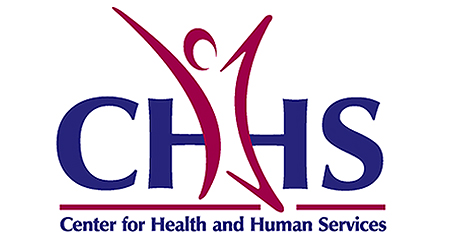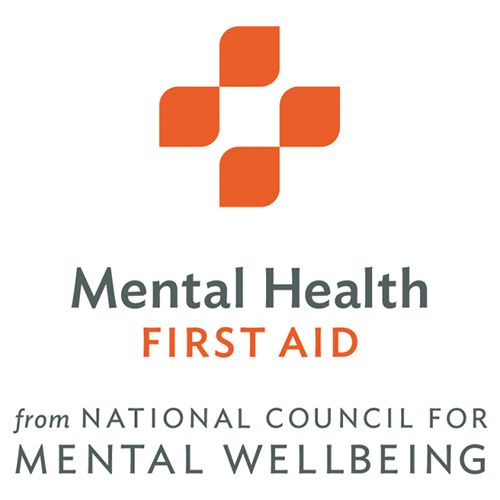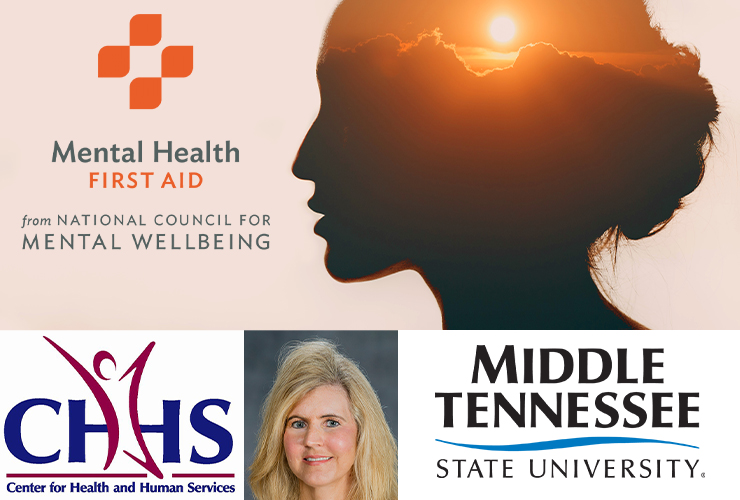Members of the MTSU campus community soon will be trained in how to notice and respond to mental health and addiction challenges commonly experienced by young people in higher education settings.
Thanks to a $500,000 federal grant recently secured by the MTSU Center for Health and Human Services, students, faculty and staff will have an opportunity to receive certification through Mental Health First Aid for Higher Education, an “evidence-based curriculum” that will train them to know how to handle a range of possibilities that commonly occur as a person experiences symptoms of mental illness.

Training, which the campus community was first offered in 2019-21, will include topics such as depression, anxiety, suicidal ideations, trauma, nonsuicidal self-harm, psychosis and substance use and misuse, said Cynthia Chafin, center director and the principal investigator for the project.
CHHS has received funding to relaunch the certification effort for four years beginning this month. When the project is fully relaunched, multiple workshops, which can provide two-year certifications to MTSU students, staff and faculty, will take place each month.
The center’s goal is to reach 1,120 participants over the four-year period and offer approximately seven workshops per quarter. Each workshop lasts eight hours and will be provided free to campus participants.

MTSU’s CHHS piloted this project in 2019 through an earlier grant and successfully trained over 1,100 students, faculty and staff, making more than 1,300 referrals over a three-year period “with demonstrated reduction of stigma for those participating in the program,” according to Chafin.
The 2019-21 pilot project was well-received on campus, she noted, adding that she knows the difference that education and skills training can make, along with programming that creates cultural shifts in how mental illness is perceived.
“Of all the projects CHHS has had over almost three decades, this one has generated more interest than any other I have seen during my time here at MTSU,” Chafin said.
“Since 2019 when our pilot project began, and continuing to this day, I get calls and inquiries almost weekly about this program, about how we really need something like it on campus, and when can we bring back what we did (then). Mental Health First Aid has so much potential to raise cultural literacy and reduce stigma around mental illness.”

The American College Health Association reports that 1 in 5 university students is affected with anxiety or depression. Becoming educated about what is happening when someone presents with potential symptoms and what can be done to effectively help can be a life-changing experience for both the mental health first-aid provider and the person in crisis, Chafin added.
CHHS worked with multiple departments and groups on campus to deliver training, including several that require mental health awareness training in their degree programs or classroom activities, such as the Department of Psychology, School of Nursing, College of Liberal Arts, Child Development and Family Studies Program and the Nutrition and Food Science Program‘s dietetics concentration.
Funding for the new grant is provided from the Substance Abuse and Mental Health Services Administration, a division of the U.S. Department of Health and Human Services.
CHHS previously partnered with MTSU Counseling Services and the university’s Center for Counseling and Psychological Services to help campus community members. Chafin said the CHHS team hopes to continue working with those centers over the course of the relaunched project.
Mental Health First Aid facilitators from the pilot project will be invited to continue leading sessions, and new facilitators will be hired, along with a program coordinator. Facilitators have attended a one-week intensive certification conference to ensure their adherence to the curriculum.
Local behavioral health providers in the Middle Tennessee area who previously served as community partners also have been educated on Mental Health First Aid and will be asked again to participate in relevant data collection over the next four years.
MTSU’s Center for Health and Human Services collaborates with public agencies, private for-profit and not-for-profit organizations and MTSU faculty and students to improve the health and well-being of Tennesseans and Americans.
For more information on MTSU’s Center for Health and Human Services and the Mental Health First Aid grant activities, email Chafin at Cynthia.Chafin@mtsu.edu or visit the center’s website at www.mtsu.edu/chhs/MentalHealthFirstAid.php.
To learn more about Mental Health First Aid, visit www.mentalhealthfirstaid.org.


COMMENTS ARE OFF THIS POST